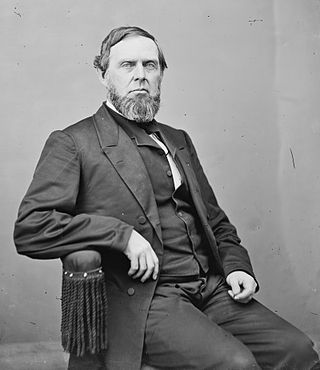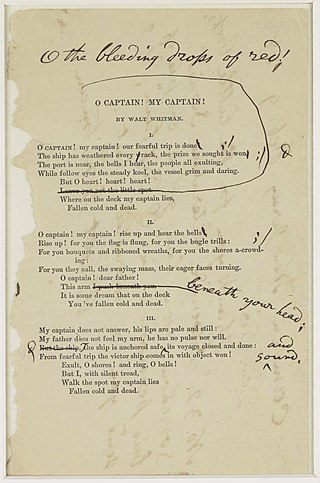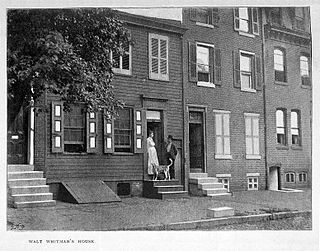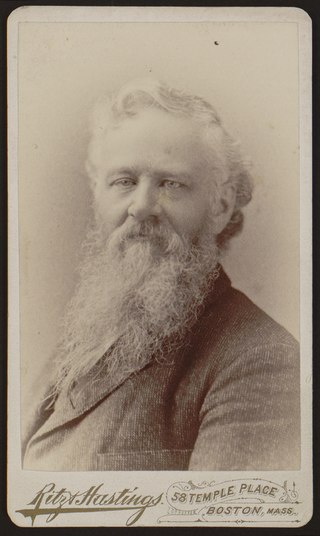
Walter Whitman Jr. was an American poet, essayist, and journalist. He is considered one of the most influential poets in American literature. Whitman incorporated both transcendentalism and realism in his writings and is often called the father of free verse. His work was controversial in his time, particularly his 1855 poetry collection Leaves of Grass, which was described by some as obscene for its overt sensuality.

Leaves of Grass is a poetry collection by American poet Walt Whitman. Though it was first published in 1855, Whitman spent most of his professional life writing, rewriting, and expanding Leaves of Grass until his death in 1892. Six or nine individual editions of Leaves of Grass were produced, depending on how they are distinguished. This resulted in vastly different editions over four decades. The first edition was a small book of twelve poems, and the last was a compilation of over 400.

"Song of Myself" is a poem by Walt Whitman (1819–1892) that is included in his work Leaves of Grass. It has been credited as "representing the core of Whitman's poetic vision."

James Harlan was an attorney and politician, a member of the United States Senate, a U.S. Cabinet Secretary at the United States Department of Interior under President Andrew Johnson, and a Federal Judge.

A dactyl is a foot in poetic meter. In quantitative verse, often used in Greek or Latin, a dactyl is a long syllable followed by two short syllables, as determined by syllable weight. The best-known use of dactylic verse is in the epics attributed to the Greek poet Homer, the Iliad and the Odyssey. In accentual verse, often used in English, a dactyl is a stressed syllable followed by two unstressed syllables—the opposite is the anapaest.

"O Captain! My Captain!" is an extended metaphor poem written by Walt Whitman in 1865 about the death of U.S. president Abraham Lincoln. Well received upon publication, the poem was Whitman's first to be anthologized and the most popular during his lifetime. Together with "When Lilacs Last in the Dooryard Bloom'd", "Hush'd Be the Camps To-day", and "This Dust was Once the Man", it is one of four poems written by Whitman about the death of Lincoln.

"When Lilacs Last in the Dooryard Bloom'd" is a long poem written by American poet Walt Whitman (1819–1892) as an elegy to President Abraham Lincoln. It was written in the summer of 1865 during a period of profound national mourning in the aftermath of the president's assassination on 14 April of that year.
"Crossing Brooklyn Ferry" is a poem by Walt Whitman, and is part of his collection Leaves of Grass. It describes the ferry trip across the East River from Manhattan to Brooklyn at the exact location that was to become the Brooklyn Bridge.

Sarah Helen Power Whitman was an American poet, essayist, transcendentalist, spiritualist and a romantic interest of Edgar Allan Poe.

James Ripley Osgood (1836–1892) was an American publisher in Boston. He was involved with the publishing company that became Houghton Mifflin.
"I Sing the Body Electric" is a poem by Walt Whitman from his 1855 collection Leaves of Grass. The poem is divided into nine sections, each celebrating a different aspect of human physicality.
"Sea-Drift" is the title of a section of Walt Whitman's great poetic work Leaves of Grass, first published in 1855. It is a compilation of poems referring to the sea or the sea-shore.

"Hush'd Be the Camps To-Day" is a poem by Walt Whitman dedicated to Abraham Lincoln. The poem was written on April 19, 1865, shortly after Lincoln's assassination. Whitman greatly admired Lincoln and went on to write additional poetry about him: "O Captain! My Captain!", "When Lilacs Last in the Dooryard Bloom'd", and "This Dust Was Once the Man." "Hush'd" is not particularly well known, and is generally considered to have been hastily written. Some critics highlight the poem as Whitman's first attempt to respond to Lincoln's death and emphasize that it would have drawn comparatively little attention if Whitman had not written his other poems on Lincoln.

The Walt Whitman House is a historic building in Camden, New Jersey, United States, which was the last residence of American poet Walt Whitman, in his declining years before his death. It is located at 330 Dr. Martin Luther King Jr. Boulevard, known as Mickle St. during Whitman's time there.

"This Dust Was Once the Man" is a brief elegy written by Walt Whitman in 1871. It was dedicated to Abraham Lincoln, the 16th president of the United States, whom Whitman greatly admired. The poem was written six years after Lincoln's assassination. Whitman had written three previous poems about Lincoln, all in 1865: "O Captain! My Captain!", "When Lilacs Last in the Dooryard Bloom'd", and "Hush'd Be the Camps To-Day".

Horace Logo Traubel (1858–1919) was an American essayist, poet, magazine publisher, writer, and Georgist. Traubel was closely associated with the Arts and Crafts movement in the United States and published a monthly literary magazine called The Conservator from 1890 until the time of his death. Although a poet of note in his own right, Traubel is best remembered as the literary executor and biographer of his friend, poet Walt Whitman, with whom he transcribed and compiled nine volumes of daily conversations, entitled With Walt Whitman in Camden.

The American poet Walt Whitman greatly admired Abraham Lincoln, the 16th president of the United States, and was deeply affected by his assassination, writing several poems as elegies and giving a series of lectures on Lincoln. The two never met. Shortly after Lincoln was killed in April 1865, Whitman hastily wrote the first of his Lincoln poems, "Hush'd Be the Camps To-Day". In the following months, he wrote two more: "O Captain! My Captain!" and "When Lilacs Last in the Dooryard Bloom'd". Both appeared in his collection Sequel to Drum-Taps later that year. The poems—particularly "My Captain!"—were well received and popular upon publication and, in the following years, Whitman styled himself as an interpreter of Lincoln. In 1871, his fourth poem on Lincoln, "This Dust Was Once the Man", was published, and the four were grouped together as the "President Lincoln's Burial Hymn" cluster in Passage to India. In 1881, the poems were republished in the "Memories of President Lincoln" cluster of Leaves of Grass.

The American poet Walt Whitman gave a lecture on Abraham Lincoln, the 16th president of the United States, several times between 1879 and 1890. The lecture centered on the assassination of Lincoln, but also covered years leading up to and during the American Civil War and often included readings of poems such as "O Captain! My Captain!". The deliveries were generally well received, and cemented Whitman's public image as an authority on Lincoln.

William Douglas O'Connor was an American author, known in part for his association with Walt Whitman. In 1866 he authored The Good Gray Poet, a pamphlet defending Whitman.

Peter George Doyle was an Irish-born American transit worker, known for being an intimate companion of Walt Whitman from around 1865 to 1876, and to some extent to Whitman's death in 1892. Doyle also witnessed the assassination of Abraham Lincoln in 1865.
















